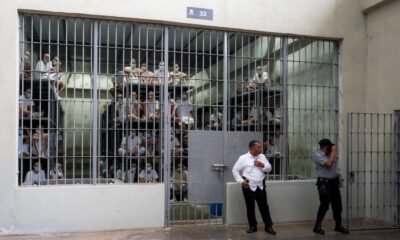Business
Students Brought to U.S. as Kids Trapped in Trump Immigration Fallout

WASHINGTON — Ximena Arias-Cristobal, a 19-year-old student from Mexico, recently experienced the harsh reality faced by many undocumented individuals in the U.S. Last month, a routine traffic stop for an improper turn in Dalton, Georgia, turned into a three-week detention at Stewart Detention Center, heightening her fears of deportation.
During a virtual event Tuesday organized by immigration advocacy groups, Arias-Cristobal shared her traumatic experience. “Even though my time there was short, the emotional weight is overwhelming,” she said. She emphasized that the plight of undocumented individuals is not merely an immigration issue but a critical human rights matter.
Arias-Cristobal moved to the U.S. illegally at the age of four. Her father, who was with her during the traffic stop, was also detained but has since been released. She recounted the distressing moment of being transported by Immigration and Customs Enforcement (ICE) agents, describing the physical restraints she endured.
Eligible for deportation protections under the Deferred Action for Childhood Arrivals (DACA) policy, Arias-Cristobal’s situation is complicated. DACA protections allow certain undocumented individuals who arrived as children to obtain work permits and driver’s licenses. However, U.S. Citizenship and Immigration Services halted DACA applications in 2021 due to ongoing legal challenges, leaving many like her in limbo.
Arias-Cristobal now faces the threat of deportation while striving to complete her economics and finance studies at Dalton State College.
Gaby Pacheco, president of TheDream.US, a scholarship organization for undocumented students, noted that cases like Arias-Cristobal’s are increasingly frequent under the current administration. “Dreamers are under attack,” she stated, highlighting the psychological toll on students pursuing higher education amidst heightened enforcement actions.
Pacheco also mentioned that while deportations of DACA recipients have been relatively rare, reports of ICE questioning targeted individuals have risen. The “level of cruelty and inhumanity” from the Department of Homeland Security, she argued, is alarming.
Higher education institutions are feeling the impact of these immigration policies. Miriam Feldblum, president of the Presidents’ Alliance on Higher Education and Immigration, noted that recent policy changes have threatened the ability of schools to accept international students. A federal court temporarily blocked the Department of Homeland Security’s withdrawal of this ability from Harvard University, recognizing its potential negative repercussions on enrollment.
Feldblum warned that limiting international student admissions not only undermines the diversity of academic institutions but also affects funding. International students often bear higher tuition rates, which support scholarships for domestic students. Without a diverse student body, higher education in the U.S. could face significant challenges ahead.


















